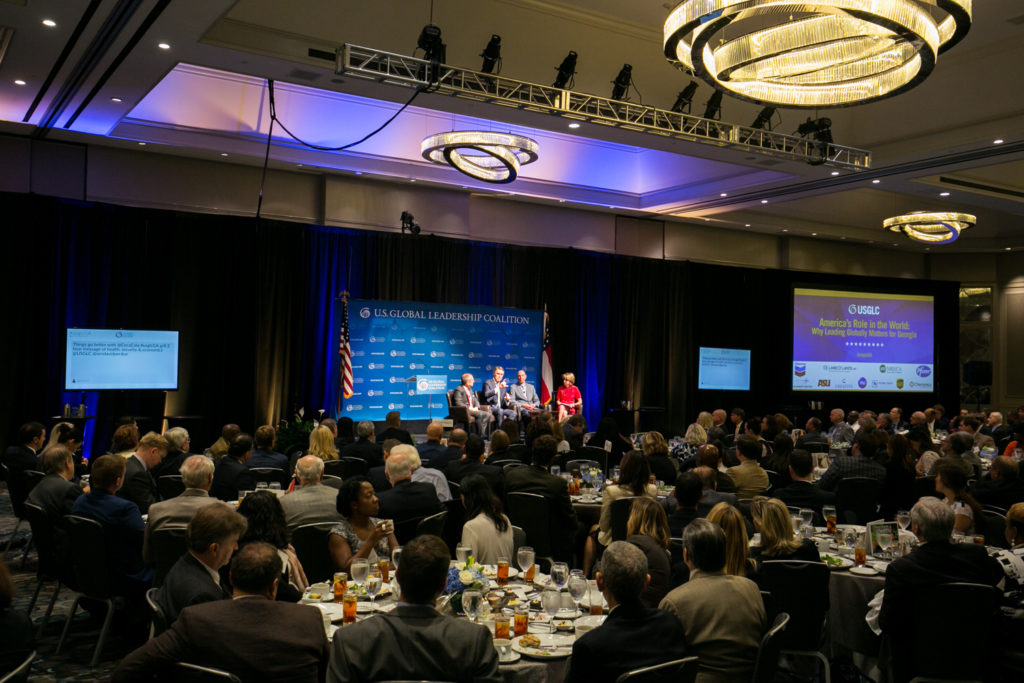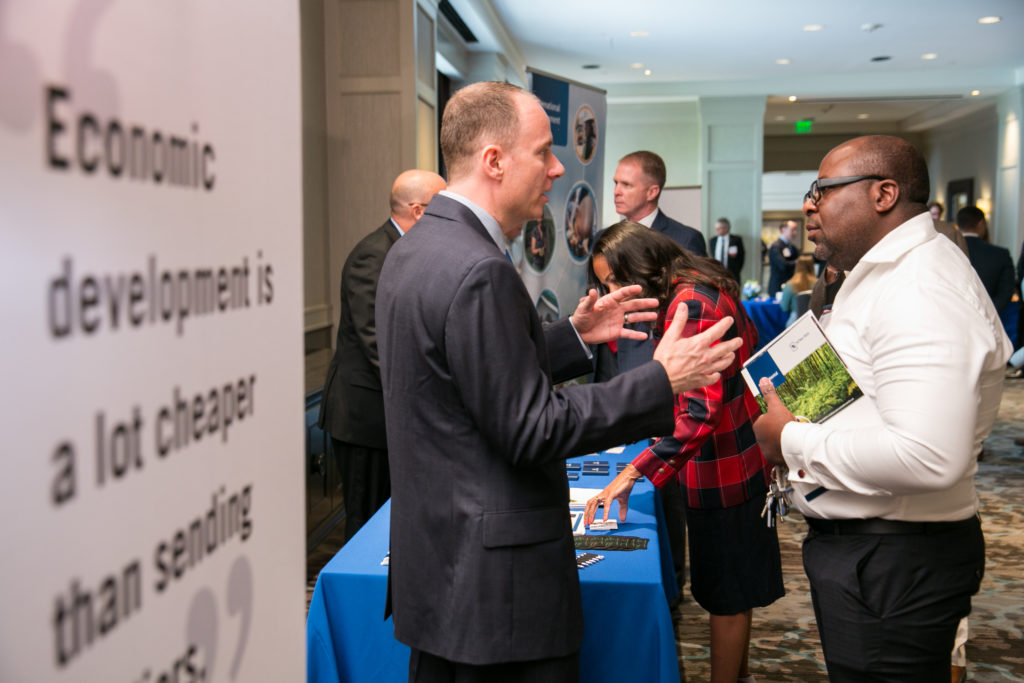

As Members of Congress headed home for the August congressional recess, we at the USGLC hit the road – delivering a simple, yet powerful message to the American people: Leading Globally, Matters Locally. From the Southwest, to the Southeast, to the Midwest, hundreds of USGLC state leaders – from the business, veteran, non-profit, and faith communities – came together for three wildly successful events with a bipartisan group of U.S. senators in support of continued investment in American diplomacy and development programs.
First Stop: Albuquerque
After launching an advisory committee in New Mexico just last month, we first flew to Albuquerque to host the USGLC’s inaugural event in the state. There, Senator Tom Udall (D-NM) forcefully rejected the Administration’s proposed cuts to the International Affairs Budget, telling the audience “these proposed cuts are a dangerous idea” and that he is “going to make sure they don’t happen.” Retired General Gene Renuart agreed with the Senator’s assessment, stating plainly that without American leadership, the world “would be a disaster.”
Carrie Hessler-Radelet, former Director of the Peace Corps and current President & CEO of Project Concern International, spoke of the economic importance of America’s leadership in the world, saying “research shows that those countries that respect rule of law and respect their citizens, are much more likely to be safer, to have their economy growing at a faster rate, and to be better global partners.” After such an engaging conversation with New Mexico leaders, we left Albuquerque encouraged and excited for the events ahead.
Excited to hear @SenatorTomUdall articulate the need for a strong international relations budget for #NM & our nation @USGLC #usglcNM #nmpol pic.twitter.com/sDnaKKhhip
— Young Women United (@YwuWomen) August 14, 2017
Next Up: Atlanta
On the heels of President Trump’s speech on the new military strategy in Afghanistan, we arrived in Atlanta, where the conversation quickly turned to national security. Senator David Perdue (R-GA) kicked off our panel discussion by stating “this is not an isolated world – if there’s one lesson we learned from 9/11, it’s that you can’t protect the national interests of our country from inside our borders.” He continued by making a pitch for our civilian tools of national security, saying “diplomacy, development, and defense – we’ve got to maintain that balance.” General Richard Hawley agreed, jumping in with “at the end of the military’s job, if we don’t have diplomacy and development to move in, governance is going to fail, almost assuredly.”
Senator Perdue also drew on his experience as a Fortune 500 CEO with extensive experience in the international marketplace to underscore the importance of our nation’s diplomatic and development programs for Georgia’s economy. The Coca-Cola Company’s Michael Goltzman – a vice president on global affairs – agreed, explaining that “if Coca-Cola is going to continue to grow, then we have got to grow in international markets” but “working with the U.S. government is the only way to…create the foundation and the infrastructure that allows us to be successful and invest in those markets.” Because at the end of the day, doing good is good business.

Honored to speak on a panel about America’s role in the world w/ Ret. @USAirForce Gen. Hawley & @mgol1068 of @CocaCola. @USGLC #gapol pic.twitter.com/KD4R7B5ZVW
— David Perdue (@sendavidperdue) August 25, 2017
Hoosiers Bring it Home
Our last stop was in Indianapolis, where former Congressman Lee Hamilton opened the program by telling hundreds of Hoosiers that “our country remains the only truly global power.” Echoing Senator Tom Udall’s comments from a few days prior – and demonstrating that bipartisan support for America’s global leadership remains strong – Senator Todd Young (R-IN) called the Administration’s proposed budget cuts “short-sighted, unwise, and dangerous” maintaining that they would “starve our development and diplomacy efforts of the resources they need.” Also speaking on the panel was John Ellenberger, a Senior Vice President for Land O’Lakes, who explained that investing in development programs is in the best interest of American businesses, stating that “In the short-term, this work changes lives for the better, and in the long run, it helps these countries become new trading partners for the United States.”
Perhaps the most moving part of the program came when Senator Young reflected on a recent trip to Afghanistan – describing our nation made sure a little boy who had lost his legs to a Taliban bomb got the wheelchair he needed, and with it, a second chance at life.

…We want to bring Indiana to the world and the world to Indiana. #ThinkGlobal #UsglcIN @USGLC @LizSchrayer pic.twitter.com/I2vFAiV1cP
— Diego Morales (@cdiegomorales) August 28, 2017
Leaving with Hope
At each event, we witnessed growing crowds of leaders and veterans who care so much about America’s role in the world – and we saw more and more press coverage from local TV news outlets and newspapers.
To close each event, our panelists were asked to share one story that gives them hope for the future. Every story was different, but each was heartfelt. A college dean spoke of welcoming Fulbright scholars from all over the world – including a young woman from Lebanon who was coming to the U.S. to study human rights, and one day, use that knowledge to make her home country a better place. A Senator talked about America’s unwavering commitment to disaster relief, and of the Haitian children who still remember that Americans were the first to help after the devastating earthquake of 2010. And a General reminded us that despite our differing backgrounds and cultures, humans around the world want the same thing – to work for a decent life, and for their kids to be a little better off than they were.
It was an inspiring end to a month of cross-country travel. And as we packed our bags and prepared to head back to Washington, we reflected on our own experiences and asked ourselves what question we heard most often from leaders across the country. The resounding consensus? “How can I do more?” – and that’s what gives us hope.
Notifications